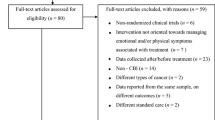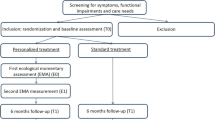Abstract
Purpose
Associations between psychological factors and cancer survival have been under debate. We retrospectively explored the effect of the Cancer Care Intervention (CCI), an individually delivered cognitive behavioral symptom management intervention on survival in individuals with cancer.
Methods
Data were obtained from a randomized controlled trial (R01 CA79280; 1997–2003) that were originally designed to evaluate the CCI to reduce symptom severity in 237 individuals with solid tumors during their first course of chemotherapy. Participants were randomized into: (1) ten-contact, 20-week CCI plus usual care (n = 118) and (2) usual care only (n = 119). Survival data as of June 2009 were censored based upon Social Security Death Index.
Results
Participants were mostly female (73.4%), Caucasian (92.8%), and 59.6 ± 10.5 years old. Breast (38.8%) and lung (35%) cancer were the most common cancer types. At enrollment, 66.7% of the participants had cancers at stage III or greater. Overall mortality was 53.2% (126 of 237). The CCI did not significantly affect survival (median survival, CCI = 88 months; usual care = 53.3 months; log rank = 0.30, p = 0.58). Age, stage of cancer, and surgical removal of the tumor were the only factors significantly associated with survival. Post hoc analysis stratified by cancer site and gender (women with breast cancer, women with lung cancer, men with lung cancer, and others) showed no survival effect from the CCI.
Conclusion
In this analysis, the CCI was not associated with better survival. For future research, studies exploring survival outcomes need to consider specific characteristics of each intervention and cancer type.

Similar content being viewed by others
References
Edwards AG, Hulbert-Williams N and Neal RD (2008) Psychological interventions for women with metastatic breast cancer. Cochrane Database Syst Rev (3): p. CD004253
Mahon SM, Cella DF, Donovan MI (1990) Psychosocial adjustment to recurrent cancer. Oncol Nurs Forum 17(3 Suppl):47–52, discussion 53–4
Kangas M, Bovbjerg DH, Montgomery GH (2008) Cancer-related fatigue: a systematic and meta-analytic review of non-pharmacological therapies for cancer patients. Psychol Bull 134(5):700–741
Antoni MH et al (2006) How stress management improves quality of life after treatment for breast cancer. J Consult Clin Psychol 74(6):1143–1152
Coyne JC, Stefanek M, Palmer SC (2007) Psychotherapy and survival in cancer: the conflict between hope and evidence. Psychol Bull 133(3):367–394
Spiegel D et al (1989) Effect of psychosocial treatment on survival of patients with metastatic breast cancer. Lancet 2(8668):888–891
Fawzy FI et al (1993) Malignant melanoma. Effects of an early structured psychiatric intervention, coping, and affective state on recurrence and survival 6 years later. Arch Gen Psychiatr 50(9):681–689
Kuchler T et al (2007) Impact of psychotherapeutic support for patients with gastrointestinal cancer undergoing surgery: 10-year survival results of a randomized trial. J Clin Oncol 25(19):2702–2708
Kuchler T et al (1999) Impact of psychotherapeutic support on gastrointestinal cancer patients undergoing surgery: survival results of a trial. Hepato-Gastroenterology 46(25):322–335
McCorkle R et al (2000) A specialized home care intervention improves survival among older post-surgical cancer patients. J Am Geriatr Soc 48(12):1707–1713
Andersen BL et al (2008) Psychologic intervention improves survival for breast cancer patients: a randomized clinical trial. Cancer 113(12):3450–3458
Cunningham AJ et al (1998) A randomized controlled trial of the effects of group psychological therapy on survival in women with metastatic breast cancer. Psycho Oncol 7(6):508–517
Edelman S et al (1999) Effects of group CBT on the survival time of patients with metastatic breast cancer. Psycho Oncol 8(6):474–481
Boesen EH et al (2007) Survival after a psychoeducational intervention for patients with cutaneous malignant melanoma: a replication study. J Clin Oncol 25(36):5698–5703
Goodwin PJ et al (2001) The effect of group psychosocial support on survival in metastatic breast cancer. N Engl J Med 345(24):1719–1726
Kissane DW et al (2007) Supportive-expressive group therapy for women with metastatic breast cancer: survival and psychosocial outcome from a randomized controlled trial. Psycho Oncol 16(4):277–286
Ilnyckyj A et al (1994) A randomized controlled trial of psychotherapeutic intervention in cancer patients. Ann R Coll Physicians Surg Can 27:93–96
Spiegel D et al (2007) Effects of supportive-expressive group therapy on survival of patients with metastatic breast cancer: a randomized prospective trial. Cancer 110(5):1130–1138
Ross L et al (2009) No effect on survival of home psychosocial intervention in a randomized study of Danish colorectal cancer patients. Psycho Oncol 18(8):875–885
Boesen EH, Johansen C (2008) Impact of psychotherapy on cancer survival: time to move on? Curr Opin Oncol 20(4):372–377
Chow E, Tsao MN, Harth T (2004) Does psychosocial intervention improve survival in cancer? A meta-analysis. Palliat Med 18(1):25–31
Smedslund G, Ringdal GI (2004) Meta-analysis of the effects of psychosocial interventions on survival time in cancer patients. J Psychosom Res 57(2):123–131, discussion 133–5
Thaker PH, Sood AK (2008) Neuroendocrine influences on cancer biology. Semin Canc Biol 18(3):164–170
Kissane D (2009) Beyond the psychotherapy and survival debate: the challenge of social disparity, depression and treatment adherence in psychosocial cancer care. Psycho Oncol 18(1):1–5
Given C et al (2004) Effect of a cognitive behavioral intervention on reducing symptom severity during chemotherapy. J Clin Oncol 22(3):507–516
Jeon S et al (2009) The utility of screening in the design of trials for symptom management in cancer. J Pain Symptom Manag 38(4):606–614
Given BA et al (2005) Effect of neutropenia on the impact of a cognitive-behavioral intervention for symptom management. Cancer 104(4):869–878
National Cancer Institute (2004) Staging: questions and answers
Quinn J, Kramer N, McDermott D (2008) Validation of the social security death index (SSDI): an important readily available outcomes database for researchers. West J Emerg Med 9(1):6–8
American Cancer Society (2010) Cancer facts & figures. 2010
Zabora J et al (2001) The prevalence of psychological distress by cancer site. Psycho Oncol 10(1):19–28
Sanders SL et al (2010) Supportive care needs in patients with lung cancer. Psycho Oncol 19(5):480–489
Carlsen K et al (2005) Psychosocial aspects of lung cancer. Lung Cancer 47(3):293–300
Sherwood P et al (2005) A cognitive behavioral intervention for symptom management in patients with advanced cancer. Oncol Nurs Forum 32(6):1190–1198
Verbrugge LM (1985) Gender and health: an update on hypotheses and evidence. J Health Soc Behav 26(3):156–182
Edelman S, Bell DR, Kidman AD (1999) A group cognitive behaviour therapy programme with metastatic breast cancer patients. Psycho Oncol 8(4):295–305
Richardson JL et al (1990) The effect of compliance with treatment on survival among patients with hematologic malignancies. J Clin Oncol 8(2):356–364
Fawzy FI, Canada AL, Fawzy NW (2003) Malignant melanoma: effects of a brief, structured psychiatric intervention on survival and recurrence at 10-year follow-up. Arch Gen Psychiatr 60(1):100–103
Fox BH (1998) A hypothesis about Spiegel et al.'s 1989 paper on Psychosocial intervention and breast cancer survival. Psycho Oncol 7(5):361–370
Kissane DW et al (2004) Supportive-expressive group therapy: the transformation of existential ambivalence into creative living while enhancing adherence to anti-cancer therapies. Psycho Oncol 13(11):755–768
Spiegel D, Classen CC (2000) Goals of supportive-expressive psychotherapy groups, in group therapy for cancer patients: a research based handbook of psychosocial care. Basic Books, NewYork, pp 28–42
Sheard T, Maguire P (1999) The effect of psychological interventions on anxiety and depression in cancer patients: results of two meta-analyses. Br J Canc 80(11):1770–1780
Kraemer HC, Kuchler T, Spiegel D (2009) Use and misuse of the consolidated standards of reporting trials (CONSORT) guidelines to assess research findings: comment on Coyne, Stefanek, and Palmer (2007). Psychol Bull 135(2):173–178, discussion 179–82
Kissane D, Li Y (2008) Effects of supportive-expressive group therapy on survival of patients with metastatic breast cancer: a randomized prospective trial. Cancer 112(2):443–444, author reply 444
Author information
Authors and Affiliations
Corresponding author
Additional information
Funding provided by the NIH, National Cancer Institute (R01 CA 79280, Barbara Given) and National Institute for Nursing Research (F32 NR 011271, JiYeon Choi), US Public Health Service
Rights and permissions
About this article
Cite this article
Choi, J., Kuo, CW.J., Sikorskii, A. et al. Cognitive behavioral symptom management intervention in patients with cancer: survival analysis. Support Care Cancer 20, 1243–1250 (2012). https://doi.org/10.1007/s00520-011-1210-0
Received:
Accepted:
Published:
Issue Date:
DOI: https://doi.org/10.1007/s00520-011-1210-0




